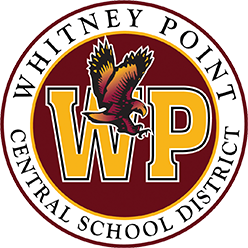Contacting the Board/FAQ's
Contacting the Board of Education/Board of Education FAQ's
Frequently asked questions about the Whitney Point Board of Education.
If I have concerns to present to the Board, what is the appropriate action to take?
If your issue is about student-related problems, the appropriate process to have your concerns addressed is:
1. Contact your student's teacher to see if the issue can be appropriately dealt with.
2. If the issue cannot be adequately resolved, contact the Building Principal.
3. If the above procedure has been followed and the issue remains unaddressed, contact the Superintendent. It is important to note that the Superintendent may refer you back to the appropriate person if this procedure is not followed.
4. If the issue remains unsolved, it is appropriate to address the Board of Education with your concerns. It is important to note, topics concerning students and/or employees will not be discussed in a public Board of Education Meeting. A letter to the Board is recommended. While comments and questions are welcomed at the Board of Education meetings, the board will generally not respond to items introduced during the public comment period. Rather, these non-agenda items will be referred to the board president and superintendent for consideration.
If your issue involves the day-to-day operation of the schools, it should be directed to the teacher or administrator closest to the situation (please see the District Communication Guidelines for further information). The board refrains from becoming involved in the day-to-day operation of the school and will refer these questions back to the district. Please follow up with a teacher, administrator of call the District Office (607-692-8313) during school hours with issues regarding school operations. Contacts for specific questions can be found here.
Can community members attend Board meetings?
Yes. Board meetings are open to the public and there are two public comment opportunities during the meeting to share public concerns. The rest of the meeting is public, but it is not an appropriate time for community interaction.
What are the responsibilities of being on the Board?
The School Board is a corporate entity with duties and mandates prescribed by law, but its leadership stems from commitments to children, learning and the community. Being a School Board member means that you are responsible for a multi-million dollar organization. Although it is a volunteer position, its duties are extremely important and essential to the functioning of the district. It is not a position to be taken lightly.
Who can be on the Board?
School board members are elected. School board candidates must be a U.S. citizen who is a legal resident within the district for a period of thirty (30) days prior to the election, and is at least 18 years of age. Candidates cannot be employed by the board on which they serve or live in the same household with a family member who is also a member of the same school board.
How do you get on the Board?
Candidates must submit a nominating petition to the school district clerk. Forms are available in the District Office. The petition must be signed by at least 25 qualified district voters. This petition must be filed with the district clerk at least 20 days before the election meeting, between the hours of 7:45 a.m. and 3:45 p.m.
What is the Board of Education?
The Board of Education carries one of the most important responsibilities that can be assigned to any citizen group: help to plan the education of the state's youth. School Board members are NYS officials. Board members receive no pay for their service except the satisfaction that comes from rendering an indispensable public service.
The Whitney Point Central School District is governed by a seven (7) member School Board. School Board members volunteer their time to represent the community for a term of three (3)) years.
The School Board is a policy making, planning and appraisal body. The School Board sets the course for the district and employs a Superintendent of Schools to carry out their policies and oversee the day-to-day operations.
What does the Board of Education do?
The School Board sets goals and establishes policy for the school system. All board decisions should follow logically from the board's delineated goals and objectives as stated in the district's Policy Manual. Board members are expected to make decisions on a wide range of issues. Some decisions are strictly routine, while others are somewhat more complex; some are extremely important and some may result from lesser concerns.
An important duty of board members is to approve the budget and spending priorities of the district; at the same time, seek to ensure adequate local, state and federal revenues to support the budget. The board should refrain from becoming involved in the day-to-day operation of the school, but it should follow up on the administration and operation of the school and require periodic reports for the purposes of evaluation.
Perhaps the most important work a board member can do is to help build the community's support and understanding of public education. This means serving as a link between the school and the public by interpreting the schools to the public and the public to the schools.
Email the BOE
Stephanie Champney (President): schampney@wpcsd.org
Christine Widdall (Vice President): cwiddall@wpcsd.org
Tyanna Moseman:
tmoseman@wpcsd.org
Erik Sculley: esculley@wpcsd.org
Thomas Tasber: ttasber@wpcsd.org
Molly Willis: mwillis@wpcsd.org
